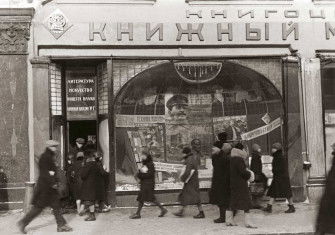Beginning at the End
A childhood world of fallen heroes and shattered certainties experienced during the fall of communism in Albania.

Picture a little girl clinging to the legs of her childhood hero. The man is long dead, so she holds on to his crumbling bronze image. The statue is battered and dented; somebody has sawn off its head. The wry smile underneath the fatherly moustache is gone, so is the mirthful twinkle in the round friendly eyes. Yet the girl’s arms hold the cold bronze remains in a tight embrace. It is a desperately sad image of childhood certainties crushed under the traumatic weight of abrupt change.
The little girl is Lea Ypi and the crumbling bronze idol of her childhood was Joseph Stalin. Ypi grew up in Albania and was 11 years old in December 1990 when the small, isolated Balkan state transitioned from one of the last Stalinist enclaves in Europe to a market economy, practically overnight. The image is evoked in Free, her first book, a powerful and thought-provoking memoir in which she takes the reader into her childhood world of fallen heroes and shattered certainties.
Ypi begins her coming-of-age story with an unvarnished and surprisingly matter-of-fact account of the communist world she grew up in. Her admiration for the founding father of Albanian communism, Enver Hoxha, was real. The West often likes to think of those who lived behind the ‘Iron Curtain’ as victims who rebelled against their oppression on occasion, but who were largely contained under the Russian yoke. Ypi tells a different story, a distinctly Albanian one seen through the prism of a child’s perception, which gives it an endearing innocence without painting a rose-tinted picture.
At school she was told that there was freedom in the equality of a classless society. She learnt that Albania had fought hard for its national freedom, for independence from Nazi Germany and from post-Stalinist Russia. Yet at home, the fear Ypi’s parents and neighbours felt about the repressive regime was ever present. So, too, were food shortages and the resulting queues at shops.
Queuing was a fact of life. Indeed, it turned into a codified ritual. Certain items, such as a brick, were deemed an acceptable placeholder for a busy human who wanted to keep their position in a queue while seeing to other matters. But the moment the desired items arrived at the shop, the brick would naturally fail to join the resulting frenzy to obtain a share of the precious and usually scarce stock. With wit and humour Ypi paints a rich and colourful picture of daily life in communist Albania without prescribing what her readers should make of it.
Free invariably returns to the title theme at every opportunity. Freedom is an emotive and powerful concept because it implies agency and control over one’s life. The people of Albania were told they were free when they lived in a totalitarian dictatorship, as in one sense they were, from the relentless work mills and precarities of capitalism. Yet there were food shortages and power cuts, political terror and oppression. When the Soviet Union fell apart, Albanians were told that the market economy and a multi-party system would bring them self-determination, travel and economic enterprise. Instead it brought corrupt pyramid schemes and a terrible civil war. Ypi’s wonderfully human memoir tells the tragic tale of this transition. It is a story of missed opportunities, disillusionment and hope that ultimately invites her readers to ask themselves what it means to be free.
Free: Coming of Age at the End of History
Lea Ypi
Allen Lane 336pp £20
Buy from bookshop.org (affiliate link)
Katja Hoyer is the author of Blood and Iron: The Rise and Fall of the German Empire 1871-1918 (The History Press, 2021).





